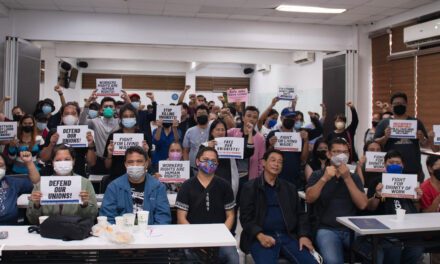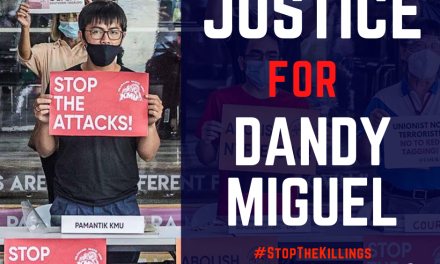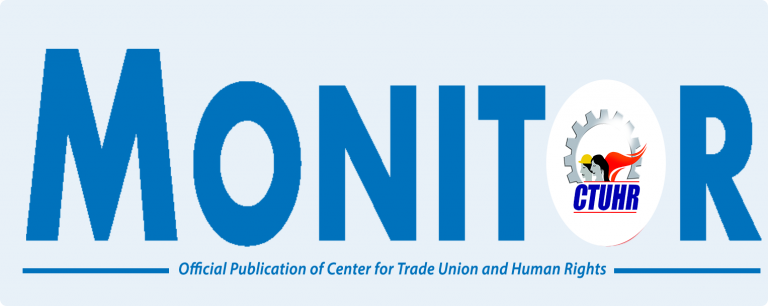While the public mourned and raged on the war on drugs-related killing of Kian Delos Santos, the House of Representatives (HOR) on August 21, 2017 passed the House Bill 6152 (HB6152) or the Compressed Work Week (CWW). HB 6152 as HOR press release described seeks to institutionalize the compressed work week scheme to promote business competitiveness, work efficiency and labor productivity. It will allow 4-day-12-hours work week, with corresponding overtime payment only if work exceeds 48 hours a week.
The Center for Trade Union and Human Rights (CTUHR), strongly opposed the bill and calls on the Senate, particularly the Labor Committee, the workers and all labor rights advocates to reject HB 6152. HB 6152 is not only retrogressive, it is an openly and plainly pro-business and pro-capitalists as HOR statement clearly expressed, while silent about detrimental effects that extended hours have on worker’s health and well being.
HB 6152 is retrogressive because it backpedals the gain of workers struggle that catapulted the more than century-old International Labor Standards and the Philippine law stipulating that eight (8) hours/day is the normal working hours. This victory was in recognition of the physical, emotional, mental, social and even economic pressure that human body can bear for a period of time, without destroying it. It was on recognition that workers are not slaves, that they are humans innate with dignity. These reasons were factored in deciding that optional corresponding overtime payment in excess of 8-hour work is paid higher than regular hour to compensate for the additional stress that it caused.
The workers minimum wages in the country are already way below the decent amount and HB 6152 will further cut on wages and income while increasing capital profits by saving on business costs. To illustrate, and assuming that companies in Metro Manila for example, pay their workers the minimum wage, a 4-day of 12- hour-work week will mean a lost of about Php1,227.42 equivalent to a 16-hour-overtime (OT) pay per week as the 4-hour supposedly OT/day will be treated as a regular hour. This is a big reduction from the worker’s income that will throw more workers into poverty and precariousness.
While a 48-hour or 72-hour rest day a week, sounds enticing and considerate under HB 6152, it is also deceptive as it completely ignored the fact that workers and their families have to eat and to support household expenses, even on rest days and income reduction will negatively impact on family basic needs. Hungry families cannot enjoy a 3-day rest. Thus, this will compel the workers to look for whatever additional sources of income, they can get, making them more vulnerable to the vagaries of the labor market. In addition, this will further increase the competition amongst workers who faces the risks of being underemployed or informally employed while providing ample window for capitalists to `manage’ the workforce pushed to choose between temporary jobs with even lower wages or nothing.
CTUHR also views that institutionalizing through HB 6152, the current pervasive and illegal company practices of forcing their workers to work 12-16 hours everyday, is only a step away towards institutionalizing the modern slavery that workers, particularly contractual workers in manufacturing, services, special economic zones are subjected into. The present reality, like in Valenzuela city where 85% of workers are in slave-like condition already smacks the `development’ that administration’s economic managers have mouthed and institutionalizing it is repulsive. It is seriously disturbing that while other countries are moving to shorten their work hours to relieve their workers from stress and help them provide a life balance, the administration is doing the contrary.
Initial findings of CTUHR’s ongoing study on the extent and impact of long working hours, suggests that excessive long working hours is detrimental to the workers’ family and social life as well as workers’ health. Interviewees noted that they have little time left to spend with their family, friends and even themselves. The 12-16 hours they spent in work, over the time spent on road traffic is already taking almost 18-20 hours of their day, draining them whatever energy is left. The study also found that these company practices heavily favor younger workers under 30 years old and single and discriminate against 30 years old and above. Interviewees averred that older workers can no longer endure long working hours, and 26 years old and above are considered old particularly in special economic zones.
The ongoing CTUHR study which started in July 3, randomly interviewed 189 workers across sectors in Metro Manila, Central Luzon, Laguna and Cavite and 85% of interviewees said they work for at least 12 hours a day. During the interview, workers have difficulty distinguishing which of the 8-hour or 12-hour workday are their normal working hours because they are required to work 12 hours and seldom paid overtime premium
CTUHR considers this back-breaking 12 hour-day work as already forced labor, cashing on the strength of the youth. Institutionalizing it, rather than prohibiting, so that business can be competitive and productivity is higher, is modern slavery, plain and simple. The Duterte administration has already failed on his promise to end contractualization, to implement a national wage, and introducing another law to exact more from workers is far too much.
HB 6152 is also worse than the much-criticized CWW by the past administrations, which exist until today. Previously, companies are allowed to implement flexible working schemes such as the compressed work week (CWW) but requires the consent of workers or the union to such arrangement. Employers are also required to notify DOLE before they can implement CWW. At the same time, companies with hazardous chemicals and substances that work beyond eight (8) hours require a certification from an accredited health and safety organization to asses if exposure is within threshold limits or tolerable levels. HB 6152 removes all these scant protection to workers.
In March of this year, Sen. Grace Poe’s spoke of filing a worth supporting resolution to look into the dramatic rise of overworked Filipino workers to more than eight (8) million as indicated in the PSA data on Decent Work in the Philippines. She expressed alarm on the situation of overworked workers As Sen. Grace Poe puts it, “Too much work kills.”
CTUHR finds this very relevant to this debate regarding the compressed work-week. HB 6152 will only worsen the working conditions and increase the number of overworked Filipinos. Reducing the number of work days but making them work for longer periods of time does not provide a work-life balance. It will only expose them to more stress, fatigue, other illnesses and accidents. And while the wages are pegged at very low rates, workers will only be forced to look for alternative sources of income during their supposed rest days to compensate for what they will lose as overtime pay.
CTUHR urges the Senate to reject HB 6152, and instead, provide the workers some degree of protection by immediately passing the Occupational Safety and Health bill that was already approved by the House of Representatives.#






